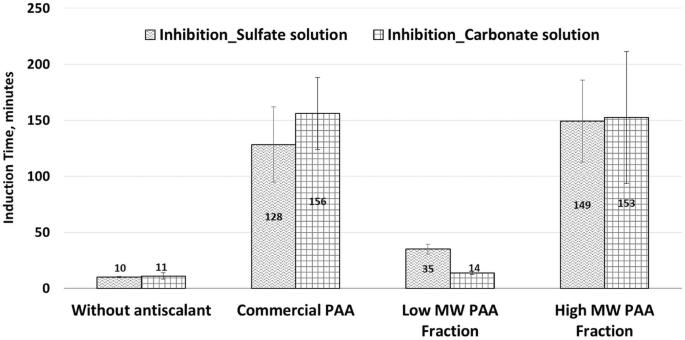Investigation of scaling inhibition and biofouling potential of different molecular weight fractions of a PAA antiscalant
IF 10.4
1区 工程技术
Q1 ENGINEERING, CHEMICAL
引用次数: 0
Abstract
This study investigates the scale inhibition performance of a commercial polyacrylic acid-based (PAA) antiscalant used for drinking water production and its molecular weight fractions (≤ 500 Da, ≥ 500 Da). The investigated antiscalant is used to prevent sulfate and carbonate scaling in treatment of drinking water sources by reverse osmosis or nanofiltration (RO/NF). Based on two complementary tests involving determination of induction time in a batch test and rate of flux decline in a lab-scale RO/NF plant, concordant results were obtained, proving that the overall performance of commercial PAA was controlled almost entirely by the higher molecular weight fraction. The low molecular weight fraction, which is potentially more permeable through the NF/RO membrane, showed poor inhibition against both sulfate and carbonate scalants. Furthermore, measurements on the assimilable organic carbon (AOC) by flow cytometry reveals that the low molecular weight PAA fraction has low biological stability, as its potential transport into the permeate of a NF270 nanofiltration membrane was inferred by elevated AOC values in the NF-permeate. These results are crucial information for water utilities, plant engineering, regulatory bodies and public authorities with respect to the possible operation of RO/NF especially in drinking water production.

不同分子量馏分的 PAA 防垢剂的阻垢和生物污染潜力研究
本研究调查了一种用于饮用水生产的商用聚丙烯酸基 (PAA) 防垢剂及其分子量馏分(≤ 500 Da,≥ 500 Da)的阻垢性能。所研究的抗垢剂用于防止通过反渗透或纳滤(RO/NF)处理饮用水源时出现硫酸盐和碳酸盐结垢。根据两项互补试验,即确定批量试验中的诱导时间和实验室规模 RO/NF 设备中的通量下降率,得出了一致的结果,证明商用 PAA 的整体性能几乎完全由高分子量部分控制。低分子量部分在反渗透/反硝化纤维膜中的潜在渗透性更强,但对硫酸盐和碳酸盐鳞片的抑制作用较差。此外,通过流式细胞仪对可同化有机碳(AOC)的测量显示,低分子量 PAA 部分的生物稳定性较低,因为 NF270 纳滤膜渗透液中 AOC 值的升高推断出低分子量 PAA 部分有可能被输送到 NF270 纳滤膜的渗透液中。这些结果对于水务公司、工厂工程、监管机构和公共当局来说,是反渗透/纳滤膜(尤其是在饮用水生产中)运行的关键信息。
本文章由计算机程序翻译,如有差异,请以英文原文为准。
求助全文
约1分钟内获得全文
求助全文
来源期刊

npj Clean Water
Environmental Science-Water Science and Technology
CiteScore
15.30
自引率
2.60%
发文量
61
审稿时长
5 weeks
期刊介绍:
npj Clean Water publishes high-quality papers that report cutting-edge science, technology, applications, policies, and societal issues contributing to a more sustainable supply of clean water. The journal's publications may also support and accelerate the achievement of Sustainable Development Goal 6, which focuses on clean water and sanitation.
 求助内容:
求助内容: 应助结果提醒方式:
应助结果提醒方式:


